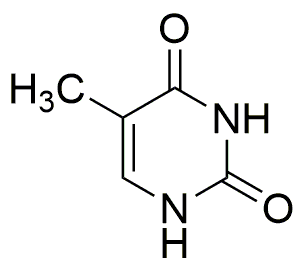Thymine is widely utilized in research focused on:
- DNA Synthesis: Thymine is a key component of DNA, playing a crucial role in the formation of genetic material. It is essential for researchers in genetics and molecular biology who are studying DNA replication and repair mechanisms.
- Pharmaceutical Development: In the pharmaceutical industry, thymine derivatives are explored for their potential in developing antiviral and anticancer drugs. This application is particularly relevant in the search for treatments that target specific genetic pathways.
- Biotechnology: Thymine is used in various biotechnological applications, including the design of synthetic genes and the production of recombinant proteins. Its role in genetic engineering makes it invaluable for researchers aiming to manipulate genetic sequences.
- Diagnostic Tools: Thymine is utilized in the development of diagnostic assays, such as PCR (Polymerase Chain Reaction) tests. These tests are essential for detecting genetic disorders and infectious diseases, providing rapid and accurate results.
- Research on Nucleic Acid Structures: Scientists study thymine to understand the structural properties of nucleic acids. This research aids in the design of novel biomaterials and nanostructures for various applications in materials science.
General Information
Properties
Safety and Regulations
Applications
Thymine is widely utilized in research focused on:
- DNA Synthesis: Thymine is a key component of DNA, playing a crucial role in the formation of genetic material. It is essential for researchers in genetics and molecular biology who are studying DNA replication and repair mechanisms.
- Pharmaceutical Development: In the pharmaceutical industry, thymine derivatives are explored for their potential in developing antiviral and anticancer drugs. This application is particularly relevant in the search for treatments that target specific genetic pathways.
- Biotechnology: Thymine is used in various biotechnological applications, including the design of synthetic genes and the production of recombinant proteins. Its role in genetic engineering makes it invaluable for researchers aiming to manipulate genetic sequences.
- Diagnostic Tools: Thymine is utilized in the development of diagnostic assays, such as PCR (Polymerase Chain Reaction) tests. These tests are essential for detecting genetic disorders and infectious diseases, providing rapid and accurate results.
- Research on Nucleic Acid Structures: Scientists study thymine to understand the structural properties of nucleic acids. This research aids in the design of novel biomaterials and nanostructures for various applications in materials science.
Documents
Safety Data Sheets (SDS)
The SDS provides comprehensive safety information on handling, storage, and disposal of the product.
Product Specification (PS)
The PS provides a comprehensive breakdown of the product’s properties, including chemical composition, physical state, purity, and storage requirements. It also details acceptable quality ranges and the product's intended applications.
Certificates of Analysis (COA)
Search for Certificates of Analysis (COA) by entering the products Lot Number. Lot and Batch Numbers can be found on a product’s label following the words ‘Lot’ or ‘Batch’.
*Catalog Number
*Lot Number
Certificates Of Origin (COO)
This COO confirms the country where the product was manufactured, and also details the materials and components used in it and whether it is derived from natural, synthetic, or other specific sources. This certificate may be required for customs, trade, and regulatory compliance.
*Catalog Number
*Lot Number
Safety Data Sheets (SDS)
The SDS provides comprehensive safety information on handling, storage, and disposal of the product.
DownloadProduct Specification (PS)
The PS provides a comprehensive breakdown of the product’s properties, including chemical composition, physical state, purity, and storage requirements. It also details acceptable quality ranges and the product's intended applications.
DownloadCertificates of Analysis (COA)
Search for Certificates of Analysis (COA) by entering the products Lot Number. Lot and Batch Numbers can be found on a product’s label following the words ‘Lot’ or ‘Batch’.
*Catalog Number
*Lot Number
Certificates Of Origin (COO)
This COO confirms the country where the product was manufactured, and also details the materials and components used in it and whether it is derived from natural, synthetic, or other specific sources. This certificate may be required for customs, trade, and regulatory compliance.


